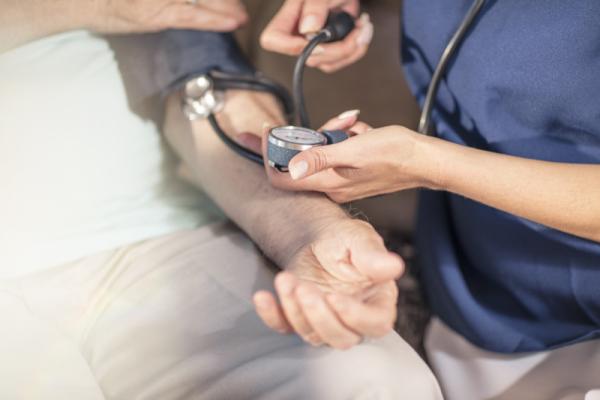
Apparent resistant hypertension prevalence was lower in a real-world sample than previously reported, but still relatively frequent, said Joseph Ebinger, MD, of the Smidt Heart Institute at Cedars-Sinai. Photo by Getty.
September 22, 2023 — For many patients with hypertension--an elevated blood pressure that can lead to stroke or heart attack--medication keeps the condition at bay. But what happens when medication that physicians usually prescribe doesn’t work? Known as apparent resistant hypertension (aRH), this form of high blood pressure requires more medication and medical management.
Novel research from investigators in the Smidt Heart Institute at Cedars-Sinai, published today in the peer-reviewed journal Hypertension, found that aRH prevalence was lower in a real-world sample than previously reported, but still relatively frequent--affecting nearly 1 in 10 hypertensive patients.
Through their analysis, investigators also learned that patients with well-managed aRH were more likely to be treated with a commonplace medication called mineralocorticoid receptor antagonist, or MRA. These MRA treatments were used in 34% of patients with controlled aRH, but only 11% of patients with uncontrolled aRH.
"Apparent resistant hypertension is more common than many would anticipate," said Joseph Ebinger, MD, assistant professor of Cardiology in the Smidt Heart Institute and corresponding author of the study. "We also learned that within this high-risk population, there are large differences in how providers treat high blood pressure, exemplifying a need to standardize care."
Study findings were based on a unique design, which used clinically generated data from the electronic health records of three large, geographically diverse healthcare organizations. Of the 2,420,468 patients analyzed in the study, 55% were hypertensive. Of these hypertension patients, 8.5%, or 113,992 individuals, met criteria for aRH.
According to Ebinger, treating aRH can be just as tricky as diagnosing it.
In fact, the "apparent" in apparent resistant hypertension stems from the fact that before diagnosis, medical professionals must first rule out other potential reasons for a patient’s blood pressure to be high.
These reasons might include medication non-adherence, inappropriate medication selection, or artificially elevated blood pressure in the doctor’s office--known as "white coat hypertension."
"Large amounts of data tell us that patients with aRH, compared to those with non-resistant forms of hypertension, are at greatest risk for adverse cardiovascular events," said Ebinger, director of Clinical Analytics in the Smidt Heart Institute. "Identifying these patients and possible causes for their elevated blood pressure is increasingly important."
The takeaway, Ebinger says, is awareness--for both medical professionals and patients. He says providers should be mindful that if it’s taking four or more antihypertensive medications to control a patient’s blood pressure, they should consider evaluation for alternative causes of hypertension, or refer patients to a specialist.
Similarly, patients should lean on their medical providers to help them navigate the complex disease, including having a conversation around strategies for remembering to take their medication and addressing possible treatment side effects.
Treating patients with complex cardiac issues like aRH is at the heart of Cedars-Sinai’s expertise.
The Smidt Heart Institute was recently awarded the American Heart Association’s Comprehensive Hypertension Center Certification, recognizing the institute’s commitment to following proven, research-based treatment guidelines to care for people with complex or difficult-to-treat hypertension.
"This accreditation, coupled with our clinical and research expertise in hypertensive diseases, serves as a mark of excellence," said Christine M. Albert, MD, MPH, chair of the Department of Cardiology and the Lee and Harold Kapelovitz Distinguished Chair in Cardiology. "These efforts signal to patients, healthcare providers, and the community that the Smidt Heart Institute is committed to delivering evidence-based, comprehensive care for hypertension."
For more information: www.cedars-sinai.org


 January 05, 2026
January 05, 2026 









